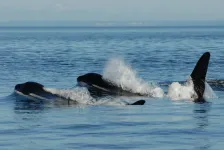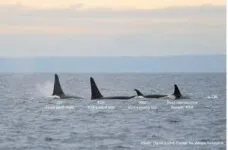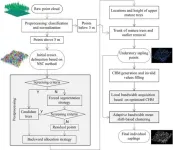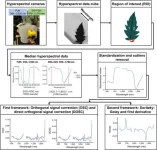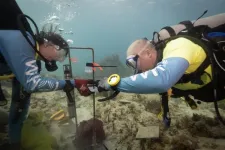(Press-News.org) Females of some whale species have evolved to live drastically longer lives so they can care for their families, new research shows.
The study focussed on five whale species that – along with humans – are the only mammals known to go through menopause.
The findings show that females of these whale species that experience menopause live around 40 years longer than other female whales of a similar size.
By living longer without extending their “reproductive lifespan” (the years in which they breed), these females have more years to help their children and grandchildren, without increasing the “overlap” period when they compete with their daughters by breeding and raising calves at the same time.
This new research shows that – despite being separated by 90 million years of evolution – whales and humans show remarkably similar life histories, which have evolved independently.
The study was carried out by the universities of Exeter and York, and the Center for Whale Research.
“The process of evolution favours traits and behaviours by which an animal passes its genes to future generations,” said lead author Dr Sam Ellis, from the University of Exeter.
“The most obvious way for a female to do this is to breed for the entire lifespan – and this is what happens in almost all animal species. There are more than 5,000 mammal species, and only six are known to go through menopause.
“So the question is: how and why did menopause evolve? Our study provides some of the answers to this fascinating puzzle.”
Menopause is known to exist in five species of toothed whale: short-finned pilot whales, false killer whales, killer whales, narwhals and beluga whales.
As well as outliving females of other similar-sized species, females in these five species outlive the males of their own species. For example, female killer whales can live into their 80s, while males are typically dead by 40.
“The evolution of menopause and a long post-reproductive life could only happen in very specific circumstances,” said Professor Darren Croft, of the University of Exeter and Executive Director at the Center for Whale Research
“Firstly, a species must have a social structure in which females spend their lives in close contact with their offspring and grand-offspring.
“Secondly, the females must have an opportunity to help in ways that improve the survival chances of their family. For example, female toothed whales are known to share food and use their knowledge to guide the group to find food when it is in short supply.”
Professor Dan Franks, from the University of York, said: "Previous research on menopause evolution has tended to focus on single species, typically humans or killer whales.
“This study is the first to cross several species, enabled by the recent discovery of menopause in multiple species of toothed whales.
“Our study provides evidence that menopause evolved by expanding female lifespan beyond their reproductive years, rather than from reduced reproductive lifespan.
“This is a question that has long been asked in anthropology, but can only be directly answered with a comparative study."
Commenting on parallels with the evolution of menopause in humans, Professor Croft added: “It’s fascinating that we share this life history with a taxonomic group we’re so different from.
“Despite these differences, our results show that humans and toothed whales show convergent life history – just like in humans, menopause in toothed whales evolved by selection to increase the total lifespan without also extending their reproductive lifespan.”
The study was funded by the Leverhulme Trust and the Natural Environment Research Council (NERC).
The paper, published in the journal Nature, is entitled: “The evolution of menopause in toothed whales.”
END
Menopause explains why some female whales live so long
2024-03-13
ELSE PRESS RELEASES FROM THIS DATE:
Supply chain disruptions will further exacerbate economic losses from climate change
2024-03-13
UCL Press Release
Under embargo until Wednesday 13 March 2024, 16:00 UK time / 12:00 US Eastern time
Global GDP loss from climate change will increase exponentially the warmer the planet gets when its cascading impact on global supply chains is factored in, finds a new study led by UCL researchers.
The study, published in Nature, is the first to chart “indirect economic losses” from climate change on global supply chains that will affect regions that would have been less affected by projected warming temperatures.
These previously unquantified disruptions in supply chains will further exacerbate projected economic losses due ...
The SNF Institute for Global Infectious Disease Research announces new advisory board
2024-03-13
From identifying the influenza virus that caused the pandemic of 1918 to developing vaccines against pneumococcal pneumonia and bacterial meningitis in the 1970s, combating infectious disease has a rich history at Rockefeller. That tradition continues as the Stavros Niarchos Foundation Institute for Global Infectious Disease Research at Rockefeller University (SNFiRU) caps a successful first year with the establishment of a new advisory board.
This international advisory board was created in part to give guidance on how to best use ...
How the brain wakes us from daydreams
2024-03-13
When we daydream, we must be able to snap back to attention at a moment’s notice. Researchers at Boston Children’s Hospital uncovered how our brains can do things like react to a question when we’re daydreaming: firing activity in part of the brain called the dentate gyrus keeps us focused on what’s happening in our environment. And the team found that the same neural activity also helps with forming memories. The findings were published in Nature on March 13, 2024.
“We have found a brain mechanism for breaking up periods of mind wandering and realigning the ‘cognitive ...
Revolutionizing forest management: unveiling understory saplings with advanced airborne LiDAR technology
2024-03-13
The regeneration of forest saplings is pivotal for maintaining biodiversity and ecosystem productivity, necessitating innovative management techniques for continuous forest coverage. Traditional 2-dimensional remote sensing struggles to accurately capture the complex, understory sapling dynamics. To address this, researchers are exploring the use of aerial laser scanning (ALS) for its potential in providing detailed 3-dimensional insights. However, despite progress in using ALS data to estimate tree metrics, accurately identifying and quantifying the phenotypic ...
High resolution imagery advances the ability to monitor decadal changes in emperor penguin populations
2024-03-13
Woods Hole, Mass. (March 13, 2024) - Emperor penguin populations have been exceedingly difficult to monitor because of their remote locations, and because individuals form breeding colonies on seasonal sea ice fastened to land (known as fast ice) during the dark and cold Antarctic winter.
Now, new research that incorporates very high resolution (VHR) satellite imagery with field-based validation surveys and long-term data has provided the first multi-year time series that documents emperor penguin global population trends.
Researchers ...
Gilbert H. L. Tang appointed Editor-in-Chief of JACC: Case Reports
2024-03-13
Renowned cardiovascular surgeon Gilbert H. L. Tang has been named Editor-in-Chief of JACC: Case Reports, bringing a wealth of experience and expertise to the helm of one of the top cardiovascular journals published by the American College of Cardiology.
“I am both honored and humbled to be a cardiac surgeon among the Editor-in-Chiefs in the JACC family of journals,” Tang said. “It is going to be an exciting time for JACC: Case Reports to build on a team of multidisciplinary cardiovascular practitioners with diverse backgrounds and experiences, and at different stages of their professional careers, to enhance the journal’s academic and educational impact globally.”
Tang ...
Enhancing crop nutritional analysis: a leap towards precision agriculture with multi-target regression and hyperspectral imaging
2024-03-13
Recent advancements in hyperspectral imaging and machine learning have revolutionized the non-destructive monitoring of crop nutritional status, enabling accurate prediction of plant element concentrations. Despite successes, the single-target regression method, which predicts concentrations individually, faces accuracy limitations for certain elements. Traditional methods offer accuracy but at the cost of being destructive and inefficient for large-scale use. Current research highlights the potential of multi-target ...
Sonic youth: Healthy reef sounds increase coral settlement
2024-03-13
Woods Hole, Mass. – A healthy coral reef is noisy, full of the croaks, purrs, and grunts of various fishes and the crackling of snapping shrimp. Research suggests that larval animals use this symphony of sounds to help them determine where they should live and grow.
Researchers at the Woods Hole Oceanographic Institution (WHOI) recently demonstrated that replaying healthy reef sounds could potentially be used to encourage coral larvae to recolonize damaged or degraded reefs. A reef that has been ...
Warwick awarded £11 million to train PhD students in computational modelling
2024-03-13
The University of Warwick has been awarded £11m to train PhD students in computational modelling.
The new centre will train 50 PhD students to use computational modelling to tackle pressing global sustainability challenges from accessing clean fusion energy, controlling infectious diseases, to designing energy-efficient devices such as new battery electrolytes.
The Centre for Doctoral Training in Modelling of Heterogeneous Systems (HetSys II), led by Professor James Kermode from the School of Engineering, Dr Livia Bartok-Partay from Chemistry and Professor Nicholas Hine from Physics, will train ...
Simple trick could improve accuracy of plant genetics research
2024-03-13
Researchers have published a simple trick that improves the accuracy of techniques that help us understand how external variables – such as temperature – affect gene activity in plants.
“There are really two contributions here,” says Colleen Doherty, corresponding author of a paper on the work and an associate professor of molecular and structural biochemistry at North Carolina State University. “First, we’re raising the visibility of a problem that many of us in the ...
